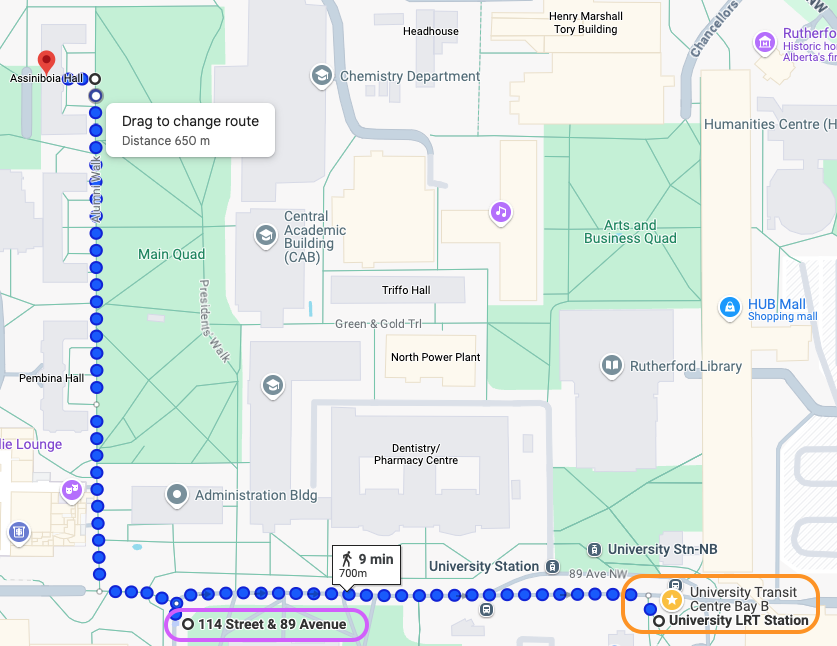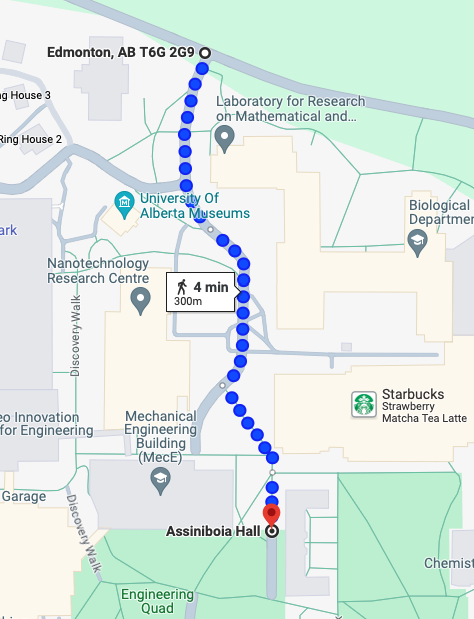Latest news & updates
- Location moved to Lecture Room 1-26 in Assiniboia Hall (same building as previously, but on the ground floor).
Getting there
Bus / LRT:
If you come by bus, you can get down at stop 114 st & 89 ave (in pink/purple on the map below) or at the University Transit Centre (in orange on the map below). If you ride the LRT, get down at the University Station and exit toward 114 Street & 89 Avenue.
Once you are outside, walk west toward the Student Union Building (SUB), then turn right to Quad. Walk North on Alumni Walk until you reach Assiniboia Hall. From the main door (see photo), get down to the first floor. The room will be across from the stair access door.


Building Front Door
Car:
On Saskatchewan Drive going east from 116 st, turn right on Alumni Walk and drive all the way and a little further to Assiniboia Hall (see map below). You should arrive to the back door (photo below), get down the stairs, in the corridor. The room will be across from the stair access door.
Note: Parking is restricted behind Assiniboia Hall. The closest parking lot is Windsor Park, on 116 St.


Building Back Door
What is NACLO?
NACLO (https://naclo.org/) is a contest in which high-school students solve linguistic problems. In solving these problems, students learn about the diversity and consistency of language, while exercising logic skills. No prior knowledge of linguistics or second languages is necessary. Professionals in linguistics, computational linguistics and language technologies use dozens of languages to create engaging problems that represent cutting edge issues in their fields. The competition has attracted top students to study and work in those same fields. It is an opportunity for young people to experience a taste of natural-language processing in the 21st century.
This year, the Alberta Language Technology Lab (ALTLab) in the Department of Linguistics at the University of Alberta and the 21st Century Tools for Indigenous Languages project (21C) is hosting NACLO in Assiniboia Hall (Moved to Lecture room ASH 1-26, on the ground floor) on the North Campus of the University of Alberta on January 23, 2025, between 10:00 am and 1:00 pm MST. For any questions related to the test-site, please email 21c.tools@ualberta.ca
To register for NACLO, fill out the form on this page: https://naclo.org/registration_page.php
To practice before the contest, check out NACLO’s problems from previous years: https://naclo.org/practice.php
ELIGIBILITY
To participate in NACLO, you must satisfy all of the following criteria:
● You have never been enrolled as a full-time college or university student.
● You must be less than 20 years old on the first day of the IOL, whose dates are at https://ioling.org/upcoming/.
● You are a citizen Canada or a student in a secondary school in Canada.
● You are available to participate in the contest at one of the times it’s offered.
● You can either participate in the contest at a registered university site, a registered high school site that is either your school or one that accepts outside students, or find a teacher or librarian who can set up a site at your school. In the latter case, please have your teacher review the Site Coordinator Handbook on the NACLO.org site to review what is involved.
All information about the contest is compiled in the NACLO Student Handbook
FAQ
Can younger students (e.g., middle school students) participate?
The competition is intended for students in the 13-18 age group. If you are younger than 13, with parental permission, you can also participate. In this case, please do not register online. Instead, ask your parents to contact nacloinquiries@googlegroups.com directly.
How many problems should I expect?
Participants should expect 5-10 problems during the Open Round and 6-11 (generally harder) problems in the Invitational Round.
What problem types should I expect?
You may encounter the problem types listed below. However, this list is not exhaustive, and you may also get problems of other types. The problems will contain all information required for solving them, and you do not need any specialized linguistic knowledge.
● Translation problems: A problem includes a set of sentences in a foreign language and their translations into English, which may be in order or out of order. Your task is to learn as much as possible from these translations and then translate other given sentences to or from English. Note that the foreign language may have “tricky” structure and grammar. For example, German sentences often end in verbs. Japanese people talk differently about their family and about someone else’s family. Some languages do not use articles or any equivalent of “to be.” Others treat animate and inanimate objects differently. Be prepared to figure out these unfamiliar features from the text.
● Number problems: A problem includes foreign sentences that describe basic arithmetic facts, such as “six times four is twenty-four,” and your task is to figure out how to translate different numbers and expressions. Some languages use bases other than ten; others use different words for the same number depending on the objects being counted, etc.
● Writing systems: Your task is to figure out how a particular writing system works and then use it to write out a given text, such as an ancient inscription. Some languages are written right to left or top to bottom, others do not use vowels, etc.
● Calendar systems: Your task is to figure out what calendar was used by a particular civilization based on sentences that refer to it.
● Formal problems: In this context, “formal” means that you have to build a logical model of a language phenomenon. For example, a transformation rule may say “to convert an active voice sentence to passive voice, make the object of the former sentence the subject of the latter one, convert the verb to passive voice by using an appropriate form of the verb “to be” with the past participle of the verb, and add “by” before the word that was the subject of the former sentence.” If we apply this rule to “Maya ate an apple,” we get “An apple was eaten by Maya.”
● Phonological problems: Your task is to figure out the relationship between the sounds of a language and its writing system.
● Computational problems: Your task is to develop a procedure to perform a particular linguistic task in a way that can be carried out by a computer.
● Other types: Deciphering kinship systems, transcribing spoken dialogue, associating sentences with images, translating unknown languages from scratch, and many other types of problems.
Where can I find example problems and related reading materials?
You can find more than 200+ past problems on the main website under “Practice Problems.” You may find past IOL problems by going to https://ioling.org/problems/.
What knowledge and skills do I need?
You mostly need logical thinking, as well as basic general knowledge, such as about arithmetic and standard calendars. You do not need prior knowledge of linguistics, computer science, programming, or foreign languages.
What happens if I do well?
If you earn a high score at the Open Round, you will advance to the Invitational Round. You will be notified if you are invited to participate in the Invitational Round. The top-scoring four US students and the top-scoring four Anglophone Canadian students in the Invitational Round will be chosen to represent the United States and Anglophone Canada at the International Linguistics Olympiad provided they meet IOL eligibility requirements. Additionally, four more top-scoring US students may be invited as a second team to represent the United States at the IOL. Team members will be expected to participate in weekly online practices from early May to mid-July.
What if my question was not answered above?
If you have further questions, please contact nacloinquiries@googlegroups.com